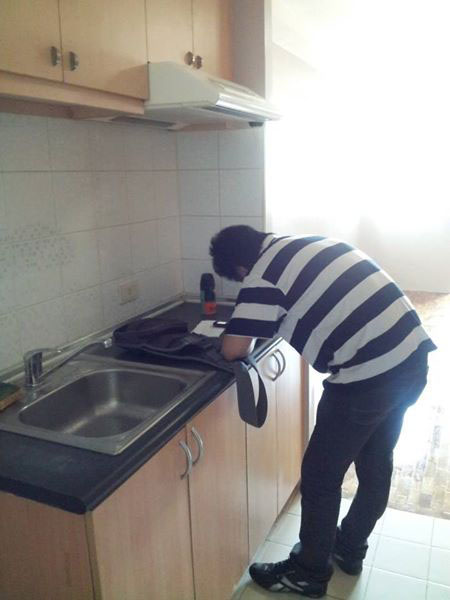Why fresh grads should leave the nest as early as possible.
[So I found this draft about moving out of your parents’ house in my unpublished posts list, and it’s so funny because I had finished writing this on March 22, 2019. ALMOST A FRICKIN’ YEAR AGO. I didn’t post it because it was a wall of text, but I was too lazy to dig up super old photos. Anyway, a few students and alumni of mine (oh, and even co-faculty!!) had been asking me about this more often recently so I thought that maybe it’s time to push it to live.]
This is the Philippines, a country where people do not move out of their parents’ homes until they marry. And sometimes, even then, some married couples still stay with their parents. I did notice though, that young people constantly complain on Facebook about their parents, and it feels weird because they still opt to live under their parents’ care. For me it’s really just two things:
- Their house, their rules.
- If you’re married: leave and cleave. My favorite celebrity couple, Richard and Maricar Poon, have more to say about this.
I left my parents’ care in my mid 20s. That was not easy because I was so used to having my parents spend for me: my own car, travel, shopping, expensive meals, heck, my mom even paid for my $6,000 credit card debt. My parents aren’t abusive, in fact, they even listened when a doctor told them I needed psychiatric help back when i was in college. They paid for my therapist. So I didn’t need to move out, actually. It was just that I had been yearning for a space of my own, my parents having instilled in me a sense of independence that could not be quenched until I got what I wanted. Plus, I really hated the travel time from Las Piñas to Makati/Manila. So much time wasted.

In one of those times I had been trying out independence, I had to share a tiny 27sqm pad with two other room mates (one of them being my sister, whose share I paid for). For the first time, I knew what it was like to feel…impoverished. No expensive meals, no travel allowances, I had to learn how to shop in thrift stores. Believe me, it was uncomfortable at first, but that feeling is dwarfed by the fact that, hey, I had complete control of my life: no curfews, not needing to rely on family drivers to get me anywhere, best of all, no one complaining about my gaming habits. (I love my mom, though, and I can’t blame her for complaining about my work being game dev and then I come home to play games. It’s only later in life will you appreciate the other stuff the world has to offer besides gaming.)
So I didn’t have a problem with my parents (they got more chill as we got older), but many people in my newsfeed do have a problem with theirs. Can you imagine spending 4 hours traveling to and from work, then coming home to a place where you are nagged for trying to be yourself? I’ve read stories about parents demanding more from their children, from attention to money. Some even force their own beliefs upon their children. Where is the mental space? (Of course, there are still those brats who complain about every little thing about their parents even if their parents are actually right, in which case I simply say: “Their house, their rules.”) People take so much of this for granted, just because think staying with their parents is the more financially viable solution.

Even the financially viable bit, I find to be not quite true, if you consider the learning opportunities that independence can teach you. In living on my own, I learned a lot of things that were, in hindsight, beneficial to my growth as an individual:
- Learned how to budget properly. If you’re living with just enough money to pay for rent and meals, oh boy, you’re gonna learn that.
- Learned how to be resourceful. I started teaching in two colleges, then also went freelance as a web developer. I quit my job as a gameplay specialist in Level Up to do this, as I was also taking my master’s at that time and I didn’t have space for a day job that couldn’t pay well. I didn’t have to stay poor for so long anyway, because graduating from master’s doubled my income, and then all the other career decisions I’ve made thereafter eventually quadrupled it.
- Learned time management. When you’re juggling graduate school and three jobs to make ends meet, you’re going to have to learn how to juggle your time while making sure that you’re not sacrificing the quality of your work. Even now, I always think of time as if its moving with my hourly rate. Four hours in a vehicle that’s stuck in traffic? Unless it’s a road trip, those 4 hours could have been used to create something.
- Learned diskarte (strategy). In grad school you’ll meet all sorts of people, including those who seem so helpless when it comes solving problems and you kind of wonder if they hadn’t been too sheltered. Independence actually teaches you basic survival skills, and you’ll be able to apply this in ALL aspects of your life. (I’d sometimes stare at a classmate and wonder why he’d find our assignments too difficult, when they weren’t, especially in master’s where everything simply needed common sense.)
- Learned how to compartmentalize mental spaces. Because you’re only thinking for yourself during your early years, you’ll eventually learn how to appreciate your “me” time, and that “me time” isn’t borrowed from other people’s concept of house rules and curfews.
- Learned how to place value in things I acquire. You become less attached to clutter when you know that there are better things to throw your money at.
- Learned that there were things I can live without. For instance, appreciating the fact that I could actually move around without having to wonder where to park. More than that, realizing that I don’t even need a car at all.
- Learned how to deal with personal adversity. Been through two robberies, and this taught me to value security (something I had taken for granted, growing up in a gated community with roving guards). Been through a pet’s death, and this taught me to always have emergency funds, not just savings. While I had pets as a kid, it had always been mommy and daddy’s money that sent them to the vet (and the helpers fed them). When the cat that husband and I reared together died, it was devastating. Both mentally and financially.
- Learned how to love myself. When you’re no longer a slave to other people’s expectations (not just your parents, but generally everyone else), you’ll eventually also learn how to take care of yourself, physically and mentally.
- Learned what my non-negotiables were when it comes to marriage. My husband moved out of his parents’ place soon after college, so he was already independent when I met him. He is highly individualistic, and values his personal space above all else, which is a trait that’s quite similar to mine. We didn’t have much of an adjustment phase, probably because we both knew how to pick up after ourselves and our roles just fell into place without us having to talk about it. Most importantly, because both of us were independent from the get go, we knew that merging into a partnership meant we would both have each other’s back, and no one else — not even our parents — are allowed to meddle in our decisions or our quarrels (note: we never tell our parents what we fight about because at the end of the day, we are a team).
- Loved and appreciated my parents more. I never appreciated how much they sacrificed for my well-being until I set off on my own. In fact, I promised never to have children until I could give them the same life (or more) that my parents gave me.

These are just eleven things I could think of off the top of my head. Sure, staying with your parents until you’re in your 50s will look financially viable, but the things that independence taught me are priceless.
Anyway, because I’ve been getting some requests, I’ll be writing a follow-up blog entry about how to strike out on your own (this will include the cities I’ve lived in just to move closer to work, along with the degree of expensiveness), and things to watch out for. Aaand another blog entry about the difference between renting and buying, which my husband and I eventually did. (Blogging seems to be easier than having to say the same things over and over to people who ask me for advice, hahaha, so I gotta work on that.)
Disclaimer: If you’re the type of person who’s supporting your family or actually need family for mental support, these may not apply to you. But if you’re the type to publicly rant about your parents or lack of autonomy on a weekly basis, you may want to consider moving out. I do not buy the excuse that my time was different and that prices are higher now. Nope. I know of recent graduates who moved out while living on almost minimum wage, and they’ve done this right after graduation. Some of them actually did so because living with their parents was detrimental to their mental health. I believe they made the right decision, and grew into impressive young adults even before they hit their mid 20s. Kung gusto, may paraan. ^_^

Leave a Reply